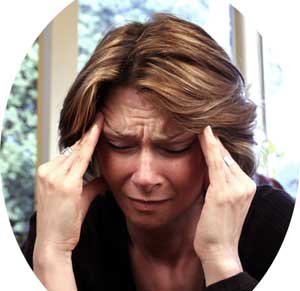 The American Heart Association has summarized the blood pressure-lowering effects of several alternative approaches and provided recommendations for their use.
The American Heart Association has summarized the blood pressure-lowering effects of several alternative approaches and provided recommendations for their use.
Here’s what we know in people with blood pressure (BP) levels higher than 120/80 mmHg. Continue reading Review: Benefits of CAM to help treat hypertension →
 Researchers at Beth Israel Deaconess Medical Center, in Boston, Massachusetts, report patterns and reasons for its use.
Researchers at Beth Israel Deaconess Medical Center, in Boston, Massachusetts, report patterns and reasons for its use.
It’s not what you think. Continue reading CAM use among people with migraine →
 MayoClinic.com tells us, “When fibromyalgia pain or fatigue is severe, you might not be thinking clearly… Having a plan to follow gives you a sense of control over your signs and symptoms.” Continue reading Plan to treat fibromyalgia pain in advance →
MayoClinic.com tells us, “When fibromyalgia pain or fatigue is severe, you might not be thinking clearly… Having a plan to follow gives you a sense of control over your signs and symptoms.” Continue reading Plan to treat fibromyalgia pain in advance →
 Dr. Robert Herron, an independent researcher, and director of the Center for Health Systems Analysis in Quebec, Canada, retrospectively assessed government payments to physicians for treating the TM and no-treatment (NT) groups. Continue reading Cost effective Transcendental Meditation →
Dr. Robert Herron, an independent researcher, and director of the Center for Health Systems Analysis in Quebec, Canada, retrospectively assessed government payments to physicians for treating the TM and no-treatment (NT) groups. Continue reading Cost effective Transcendental Meditation →
 Researchers in the US compared the effects of a nondenominational spiritual retreat on depression and well-being following acute coronary syndrome — chest pain and other symptoms when the heart doesn’t get enough blood. Continue reading Spiritual retreat for depression in patients with heart disease →
Researchers in the US compared the effects of a nondenominational spiritual retreat on depression and well-being following acute coronary syndrome — chest pain and other symptoms when the heart doesn’t get enough blood. Continue reading Spiritual retreat for depression in patients with heart disease →
 During the Clinical Oncological Society of Australia Annual Scientific Meeting, researchers at Sir Charles Gairdner Hospital, in Perth, Western Australia reported less distress, and improvements in pain, fatigue, nausea, appetite, sleep, breathing and bowel function. Continue reading Using CAM to improve the lives of cancer patients →
During the Clinical Oncological Society of Australia Annual Scientific Meeting, researchers at Sir Charles Gairdner Hospital, in Perth, Western Australia reported less distress, and improvements in pain, fatigue, nausea, appetite, sleep, breathing and bowel function. Continue reading Using CAM to improve the lives of cancer patients →
 Alexithymia is the inability to describe emotions in a verbal manner. Alexithymia is likely to be involved in the pain experience of cancer patients.
Alexithymia is the inability to describe emotions in a verbal manner. Alexithymia is likely to be involved in the pain experience of cancer patients.
Researchers at the Universidad de Almería, in Spain, report their preliminary findings using meditation (mindfulness). Continue reading Effects of meditation on alexithymia and social skills →
 Researchers from the University of Virginia Health System, in Charlottesville reviewed yoga and/or meditation-based programs, tai chi, and other relaxation practices, including muscle relaxation and breath-based techniques, relaxation response training, and low-frequency sound-wave therapy. Continue reading Review: Mind body therapies for menopausal symptoms →
Researchers from the University of Virginia Health System, in Charlottesville reviewed yoga and/or meditation-based programs, tai chi, and other relaxation practices, including muscle relaxation and breath-based techniques, relaxation response training, and low-frequency sound-wave therapy. Continue reading Review: Mind body therapies for menopausal symptoms →
 Researchers at KhonKaen University, in KhonKaen, Thailand reviewed the evidence for this Cochrane report on attention-deficit/hyperactivity disorder (ADHD). Continue reading Review: Meditation to treat ADHD →
Researchers at KhonKaen University, in KhonKaen, Thailand reviewed the evidence for this Cochrane report on attention-deficit/hyperactivity disorder (ADHD). Continue reading Review: Meditation to treat ADHD →
 Relapse is common in substance use disorders, even among treated individuals.
Relapse is common in substance use disorders, even among treated individuals.
Researchers from the University of Wisconsin, in Madison reviewed the evidence supporting mindfulness meditation. Continue reading Mindfulness meditation for substance abuse →
 Researchers from several US medical schools surveyed the students. Continue reading Survey of American medical students about CAM →
Researchers from several US medical schools surveyed the students. Continue reading Survey of American medical students about CAM →
 Researchers at Arizona State University, in Tempe studied the effects of breathing rate following thermal pain in women with fibromyalgia syndrome. Continue reading Effect of breathing rate on pain and emotion in women with fibromyalgia →
Researchers at Arizona State University, in Tempe studied the effects of breathing rate following thermal pain in women with fibromyalgia syndrome. Continue reading Effect of breathing rate on pain and emotion in women with fibromyalgia →
 The Integrative Medicine Service, at Memorial Sloan-Kettering Cancer Center, in New York City offers their perspective. Continue reading Complementary therapies for patients with leukemia →
The Integrative Medicine Service, at Memorial Sloan-Kettering Cancer Center, in New York City offers their perspective. Continue reading Complementary therapies for patients with leukemia →
 The aim of Vipassana meditation is to reduce cognitive and emotional reactivity.
The aim of Vipassana meditation is to reduce cognitive and emotional reactivity.
Dr. Alberto Chiesa at the University of Bologna, in Italy, reviewed the evidence. Continue reading Vipassana: An ancient technique of meditation →
 Anxiety and depression are among the most common conditions cited by those seeking treatment with complementary and alternative therapies.
Anxiety and depression are among the most common conditions cited by those seeking treatment with complementary and alternative therapies.
Researchers from The Brody School of Medicine at East Carolina University, in Greenville, North Carolina reviewed the evidence. Continue reading Review: CAM treatment of depression and anxiety →
 Researchers from Maharishi University of Management Research Institute, in Maharishi Vedic City, Iowa report. Continue reading Transendental Meditation in blood pressure control →
Researchers from Maharishi University of Management Research Institute, in Maharishi Vedic City, Iowa report. Continue reading Transendental Meditation in blood pressure control →
 Substance use disorders refer to conditions arising from the abuse of alcohol and psychoactive drugs.
Substance use disorders refer to conditions arising from the abuse of alcohol and psychoactive drugs.
Researchers from the University of Wisconsin in Madison reviewed the existing evidence for using mindfulness meditation — the practice of directing your full attention to the present. Continue reading What we know about mindfulness meditation in substance use disorders →
 Migraine headaches are associated with symptoms of depression, anxiety, and low self-efficacy.
Migraine headaches are associated with symptoms of depression, anxiety, and low self-efficacy.
Spiritual meditation helps ameliorate these traits, according to researchers at the University of Massachusetts Medical Center in Worcester. Continue reading Effects of spiritual meditation on migraines →
 Coronary artery calcification is the accumulation of calcified fatty deposits on the inside of the arteries that supply blood to the heart. Their presence is a predictor of future coronary heart disease. Researchers from the University of Chicago in Illinois report that sleeping longer is associated with lower calcification.
Coronary artery calcification is the accumulation of calcified fatty deposits on the inside of the arteries that supply blood to the heart. Their presence is a predictor of future coronary heart disease. Researchers from the University of Chicago in Illinois report that sleeping longer is associated with lower calcification.
Let’s review the research and reviews from 2008 that looked at CAM options to treat insomnia. Continue reading Short sleep duration and coronary artery calcification →
 The use of prayer is rarely queried in surveys of CAM use. Here are the highlights from a Centers for Disease Control survey on the use of CAM. It’s based on interviews with more than 31,000 adults. The report is available here (then go to the “Barnes PM” link) and here. Continue reading The use of prayer as CAM →
The use of prayer is rarely queried in surveys of CAM use. Here are the highlights from a Centers for Disease Control survey on the use of CAM. It’s based on interviews with more than 31,000 adults. The report is available here (then go to the “Barnes PM” link) and here. Continue reading The use of prayer as CAM →
Complementary and Alternative Medicine: Fair, Balanced, and to the Point
![]() The American Heart Association has summarized the blood pressure-lowering effects of several alternative approaches and provided recommendations for their use.
The American Heart Association has summarized the blood pressure-lowering effects of several alternative approaches and provided recommendations for their use.











 Migraine headaches are associated with symptoms of depression, anxiety, and low self-efficacy.
Migraine headaches are associated with symptoms of depression, anxiety, and low self-efficacy. Coronary artery calcification is the accumulation of calcified fatty deposits on the inside of the arteries that supply blood to the heart. Their presence is a predictor of future coronary heart disease. Researchers from the University of Chicago in Illinois
Coronary artery calcification is the accumulation of calcified fatty deposits on the inside of the arteries that supply blood to the heart. Their presence is a predictor of future coronary heart disease. Researchers from the University of Chicago in Illinois  The use of prayer is rarely queried in surveys of CAM use. Here are the highlights from a Centers for Disease Control survey on the use of CAM. It’s based on interviews with more than 31,000 adults. The report is available
The use of prayer is rarely queried in surveys of CAM use. Here are the highlights from a Centers for Disease Control survey on the use of CAM. It’s based on interviews with more than 31,000 adults. The report is available